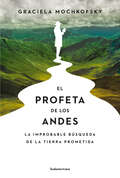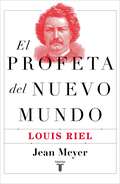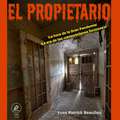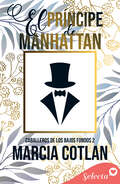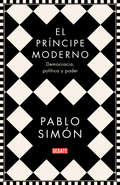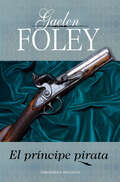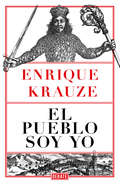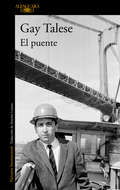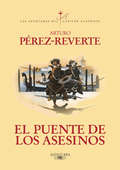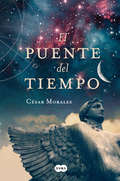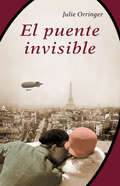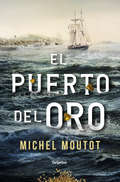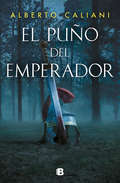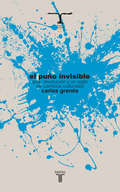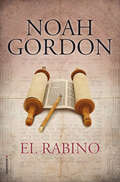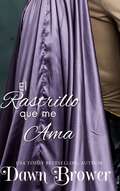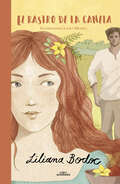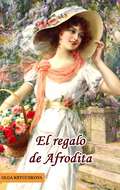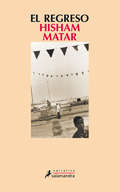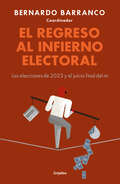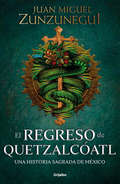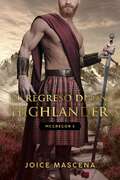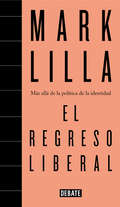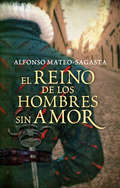- Table View
- List View
El profeta de los Andes: La improbable búsqueda de la Tierra Prometida
by Graciela MochkofskyLa increíble historia real de cómo un carpintero peruano llevó a cientos de cristianos al judaísmo. Una no-ficción fascinante, que recorre un capítulo poco conocido de la religión moderna. El conmovedor relato de una épica personal y colectiva. El profeta de los Andes recorre el increíble periplo del peruano Segundo Villanueva, quien, al leer por primera vez una Biblia que había pertenecido a su padre asesinado, emprendió una búsqueda que lo llevaría de la Iglesia católica a una sucesión de sectas protestantes, incluyendo una que él mismo fundó, hasta desembocar, finalmente, en el judaísmo. Ese recorrido espiritual, que inspiró a cientos de seguidores, lo condujo desde el norte de los Andes peruanos hasta la selva amazónica, para dejarlo, al final de su vida, en una colonia judía en los territorios palestinos ocupados de Cisjordania. Al reconstruir esa aventura extraordinaria, Graciela Mochkofsky revela el que tal vez sea uno de los capítulos más asombrosos en la historia de la religión moderna. Y construye una no ficción fascinante, rigurosamente documentada, en torno a una determinación espiritual única. Este libro, que se lee como una novela, es a la vez un relato conmovedor sobre la inquietud personal de alcanzar una verdad inasible y una épica colectiva basada en siglos de historia colonial, política y religiosa que impulsaría el surgimiento de un judaísmo latinoamericano emergente sin precedentes.
El profeta del nuevo mundo: Louis Riel
by Jean Meyer«La voz de todos los susurros de la conciencia canadiense, el símbolo de una composición étnica abigarrada» Héroe, traidor, asesino, hereje, mártir, loco, noble salvaje, agente del imperialismo yanqui, defensor de los derechos de los mestizos y de los indios, padre de la provincia de Manitoba e, incluso, uno de los fundadores de la Confederación Canadiense. La Historia quiso que epítetos tan diversos y discordantes correspondan a un mismo individuo: Louis Riel. La vida y muerte de este personaje se han convertido en mitos fundacionales de Canadá. Louis Riel fue líder del pueblo métis —etnia mestiza, de ascendencia indígena y europea— que encabezó dos movimientos de resistencia contra el gobierno canadiense. El primero (1869-1870) dio como resultado la creación de la provincia de Manitoba, y el segundo (1885) derivó en un enfrentamiento militar, la única guerra que ha tenido lugar hasta la fecha en suelo canadiense. Este conflicto, alentado por sir John Macdonald, primer ministro de Canadá, además de costarle la vida a Louis Riel, les valió a los indios su encierro en las reservas por más de sesenta años y cuyas consecuencias vemos hasta ahora. Sobre ninguna otra figura de la historia de Canadá se ha escrito tanto como sobre Louis Riel, sin embargo, ésta es la primera biografía en español. Resultado de una labor de investigación de cincuenta años, El profeta del Nuevo Mundo nos revela la vida de un hombre que quiso hacer de Canadá un espacio de comunión para las naciones.
El propietario: ¡La hora de la Gran Pandemia! ¡La era de las «renovaciones forzosas»!
by Yves Patrick BeaulieuEstán ahí, mirándote, luego te agarran y te meten en la máquina de deportación tan pronto como pueden. Tienen signos por ojos y son voraces y despiadados con sus víctimas. Algunos dicen que es urgente renovar, otros que debemos adaptarnos al mercado o corremos el riesgo de perdernos, otros insisten en acosar, simplemente por el placer de ver gemir a su presa. Alfreda Leduc, una anciana, tiene que mudarse porque su casero quiere conservar la casa en la que vive. Una pandemia azota el país y las cosas van de mal en peor. Ella se niega a ceder ante esta amenaza y decide esperar hasta que la Autoridad de Vivienda celebre una audiencia. Pero al propietario no le faltan ideas para perjudicar a su inquilina: ¡quiere sacarla de su edificio! ¿Cómo terminará este asunto? ¿En su apartamento o debajo de un puente?
El príncipe de Manhattan (Caballeros de los bajos fondos #Volumen 2)
by Marcia CotlanElla es la única mujer en la que no debe fijarse. Él es el único hombre que le interesa. Ella es lo contrario a lo que él busca en una mujer. Él es el más desquiciante de cuantos hombres ha conocido. Alistair Vuks es un sentimental. Desea amar y ser amado, quiere una familia, el calor de un hogar, pero los años pasan y no aparece la dama indicada. Sylvia Langdorf no fue educada como una dama, aunque sabe fingirlo a la perfección. Lleva toda su vida preparándose para cobrarse una venganza y eso es cuanto le importa. Lo último en lo que piensa es en el amor. Pero entonces ocurre... Ambos se encuentran y sin pretenderlo, entorpecen el camino del otro. ¿Dejará de lado Sylvia su venganza? ¿Podrá Alistair olvidar que la única mujer que ha hecho estremecer su corazón no es más que una briboncilla? ¿Será suficiente el amor para llenar el vacío que los consume a ambos?
El príncipe moderno: Democracia, política y poder
by Pablo Simón¿Cómo podemos entender la política para así poder obrar como consejeros del Príncipe? Una introducción al descompuesto y desorientador panorama de la política actual. La crisis económica ha acelerado el ritmo de los cambios políticos en todo el mundo: mayor imprevisibilidad electoral, regresiones autoritarias, surgimiento de nuevos partidos, dificultades para formar gobierno o aumento de las tensiones territoriales, todas ellas cuestiones al orden del día. Esta aceleración ha hecho que cada vez haya ganado más espacio en el debate público una figura hasta ahora ignorada: el politólogo. Este libro tiene por objeto reivindicar su papel y presentar modestamente lo que la ciencia política empírica puede aportar a este tiempo de cambios. Con guiños a la obra clásica de Nicolás Maquiavelo, El príncipe moderno hace una revisión de la agenda política contemporánea. El origen del Estado y el papel de la globalización, los ejes fundamentales de la democracia y su organización institucional, el destino de los nuevos y viejos partidos o el devenir de nuestros Estados de bienestar son algunas de las cuestiones revisadas. Muchas de ellas aún están abiertas, pero constituyen el mejor ejemplo para reivindicar la importancia de esta disciplina como un instrumento útil para entender mejor los cimientos de la política actual.
El príncipe pirata (Los príncipes del mar #Volumen 1)
by Gaelen FoleyPrimera entrega de la apasionante saga de romance histórico «Los príncipes del mar». Una noche, el príncipe Lazar di Fiori regresa a la isla de Ascensión para vengar la muerte de su familia y la usurpación de su reino. Allegra Monteverdi, la hija de su enemigo, demuestra ser una valiente adversaria y le implora para que no mate a su familia. Su belleza y valor impresionan a Lazar, por lo que accede a perdonarles la vida a condición de que se convierta en su prisionera.Sola en el mar, confundida entre el miedo y la seducción, Allegra descubre que el misterioso y vengativo hombre es el príncipe Lazar, aquél con el que soñaba cuando era niña. Pero hará falta mucho más que su creciente amor para conseguir que el príncipe pirata se enfrente a los fantasmas del pasado y consiga apaciguar su atormentado corazón.
El pueblo soy yo
by Enrique KrauzeUn manifiesto a favor de la libertad y la palabra. La democracia es frágil, mortal. Hace más de 2 mil años fue pervertida por los demagogos de Atenas. Y, hace un año en Estados Unidos, fue vulnerada por el carisma incendiario de Donald Trump. Su debilidad también es harto conocida en Latinoamérica: las dictaduras de izquierda y de derecha fueron una constante, y, hoy, el populismo atenaza la región. Enrique Krauze, en esta lúcida colección de ensayos -a caballo entre la política, la filosofía, la literatura y la historia-, advierte de los peligros de la acumulación del poder en una sola persona y sale en defensa de la democracia, el debate, la pluralidad y la tolerancia. En defensa de la libertad. * * * "Este libro es un pequeño viaje histórico, un testimonio personal, una acumulación de lo visto, oído, leído, conversado y aprendido sobre el poder personal absoluto. Y es también una argumentación crítica contra quienes, en nuestro tiempo, sienten encarnar cuatro palabras que, juntas, deberían ser impronunciables: el pueblo soy yo." Enrique Krauze
El puente
by Gay TaleseEl Maestro del Periodismo narra una auténtica epopeya humana: la crónica de la construcción de un puente convertida en un nuevo clásico. «Talese cuenta historias cálidas, divertidas y trágicas sobre hombres, mujeres, acero y hormigón. Una buena lectura.»Denver Post «Llegan a la ciudad en coches enormes, viven en habitaciones amuebladas, beben whisky acompañado de chupitos de cerveza y persiguen a mujeres que no tardarán en olvidar. Se quedan poco tiempo, no más del que necesitan para construir el puente.» A finales de 1964 se completaron las obras del puente de Verrazano-Narrows, que une Brooklyn y Staten Island y que, medio siglo después, sigue considerándose un prodigio de la ingeniería: con sus 4.176 metros de longitud, es el puente colgante más largo de Estados Unidos y el sexto del mundo. Gay Talese, que siguió de cerca el levantamiento de este monumento al esfuerzo del hombre, recogió en El puente las historias humanas que se hallaban tras su construcción, desde el día a día de los obreros que trabajaban sobre vigas a alturas de vértigo hasta los acuerdos a puerta cerrada que desplazarían vecindarios enteros para dar cabida a la bestia. Un relato fascinante de intrigas políticas y de coraje, y una demostración del talento de Talese como cronista y narrador de historias. Reseñas:«Una crónica brillante. Describe con emoción a la gente que participó en el proyecto. Ve en el puente un logro humano más que mecánico, y aporta drama y aventura a la historia de su construcción.»The New York Times Book Review «Este libro tiene el encanto de I Cover the Waterfront, de Max Miller, y la precisión de Muerte en la tarde, de Hemingway.»St. Louis Post-Dispatch «Solo un escritor enamorado de su materia puede producir un relato tan fascinante. Hay muchas historias dentro de El puente, y todas merecen ser leídas.»Houston Post «Un relato maravilloso en el que combina tristeza, humor, peligro, muerte y angustia, y que al lector le resultará difícil dejar.»Arizona Republic «Un relato fascinante y atractivo. Un drama absorbente y maravillosamente escrito.»Times Union «Talese cuenta historias cálidas, divertidas y trágicas sobre hombres, mujeres, acero y hormigón. Una buena lectura.»Denver Post
El puente de los Asesinos (Las aventuras del capitán Alatriste #Volumen 7)
by Arturo Pérez-ReverteLa séptima entrega de «Las aventuras del capitán Alatriste». Cruza el puente de los Asesinos con Arturo Pérez-Reverte y vive la trepidante conspiración para asesinar al dogo de Venecia. Nápoles, Roma y Milán son algunos escenarios de esta nueva aventura del capitán Alatriste. Acompañado del joven Íñigo Balboa, a Alatriste le ordenan intervenir en una conjura crucial para la corona española: un golpe de mano en Venecia para asesinar al dogo durante la misa de Navidad del año 1627, e imponer por la fuerza un gobierno favorable a la corte del rey católico en ese estado de Italia. Para Alatriste y sus camaradas -el veterano Sebastián Copons y el peligroso moro Gurriato, entre otros-, la misión se presenta difícil, arriesgada y llena de sorpresas. Suicida, tal vez; pero no imposible. «Diego Alatriste bajó del carruaje y miró en torno, desconfiado. Tenía por sana costumbre, antes de entrar en un sitio incierto, establecer por dónde iba a irse, o intentarlo, si las cosas terminaban complicándose. El billete que le ordenada acompañar al hombre de negro estaba firmado por el sargento mayor del tercio de Nápoles, y no admitía discusión alguna; pero nada más se aclaraba en él.»
El puente del tiempo
by César MoralesMadrid, 2012. Raquel, una joven arqueóloga, deberá descifrar un enigmático mensaje escrito hace mil trescientos años para esclarecer las causas del accidente en el que ha muerto un compañero de excavación. Ayudada por Berta, su mejor amiga, indagará en antiguos conocimientos en una búsqueda desesperada por descubrir la verdad. Durante esta investigación, su relación de amistad se pondrá a prueba cuando se cuele en sus vidas Pablo, un desconocido con extrañas intenciones. Mientras, una poderosa organización heredera de una antigua tradición sefardí hará todo lo posible para impedírselo. Hispania, siglo VIII. Un niño hispano, un joven bereber, un médico judío y un noble abad visigodo, custodios de un maravilloso objeto del que depende el futuro de un reino, huyen de la ira del emir Muza ibn Nusair. Durante su fuga, el heterogéneo grupo será testigo de cómo las huestes árabes y norteafricanas se apoderan de la Península, algo que cambiará el destino de sus habitantes para siempre. César Morales construye, con la magia de los antiguos alquimistas, una narración apasionante, una combinación perfecta de historia, arqueología, astrofísica y leyenda con una novedad: el lector más curioso puede acompañar a los protagonistas de esta novela y vivir su propia aventura a través de los códigos QR que se incluyen en estas páginas. Una búsqueda paralela por encontrar un tesoro maldito codiciado desde hace siglos.
El puente invisible
by Julie OrringerUna fría mañana de septiembre de 1937, Andras se despidió de Budapest y cogió un tren que lo conduciría muy lejos. París estaba esperándole, y allí el joven frecuentaría la mejor escuela de arquitectura de la época. Andras llevaba en el bolsillo una carta, sin saber aún que aquellos pocos folios le llevarían a conocer a Klara, una mujer frágil y hermosa, que miraba el mundo con ojos tristes y dirigía una escuela de ballet clásico. Tras unos meses de dudas y recelos, su historia de amor empezaba a tener cuerpo, pero ¿por qué de repente tanto pesar, tanto dolor en el rostro de Klara?, ¿por qué tanto silencio oscuro? En la historia, en esa pesadilla hecha de cruces gamadas y alambres que marcó el siglo XX, hubo que buscar las respuestas... De la pequeña aldea húngara de Konyár a las calles de París, de la música dulce de la rue de Sevigné a los campos de concentración, de la pasión a la tortura, las distancias a veces parecen insalvables, pero las ganas de vivir y el talento tienden puentes invisibles que nos llevan allá donde la vida aún tiene sentido y el futuro nos está esperando.
El puerto del oro
by Michel MoutotUna apasionante novela de aventuras que nos lleva de costa a costa de Estados Unidos donde, a mediados del siglo XIX, tres hermanos deciden cambiar los peligros del océano por los azares de la búsqueda del oro en la próspera y febril ciudad de San Francisco. PREMIO RELAY DE LOS VIAJEROS-LECTORES 2019 Cuando era apenas un niño, Mercator Fleming embarcó en un ballenero siguiendo la tradición familiar. Tal y como esperaban los suyos, allí se hizo un hombre y se convirtió en un experto lobo de mar, a costa de perder la inocencia. Sin embargo, a su regreso, la muerte de su padre y el alud de deudas contraídas por este lo obligan a cambiar su destino. Atraídos por las noticias de la fiebre del oro que les llegan de la costa oeste de los Estados Unidos, él y sus hermanos deciden dar un golpe de timón a sus vidas y partir por mar hacia los impresionantes bosques de secuoyas de California. Después de seis meses de intensa odisea marítima a bordo del Freedom, Mercator llega por fin a esa tierra prometida que guarda en sus entrañas pepitas de oro puro. San Francisco ha pasado de ser un pequeño pueblo en la bahía a convertirse en una ciudad sin ley marcada por la violencia, el juego y el alcohol. El joven Mercator deberá decidir entre unirse a la multitud de hombres que dedican sus vidas a la busca de esa ansiada veta dorada o hallar otro camino para labrarse ese futuro con el que soñaba antes de partir del puerto de Nantucket, un camino que lo llevará a vivir del oro sin tener que encontrarlo. El amor, la ambición, la rivalidad entre hermanos y la aventura se unen en esta espléndida novela histórica que nos lleva a una época donde el oro era la única ley, la justicia se impartía a tiros y solo los más valientes lograban sobrevivir. La crítica ha dicho...«Michel Moutot es un cronista épico. Para los amantes de las novelas de aventuras y la naturaleza, este libro es una joya.»La Vie «Una lectura para disfrutar. Una aventura formidable.»RTL «El puerto del oro es más que una novela histórica con aires de saga, es un acercamiento épico a la creación del Nuevo Mundo.»Le Figaro magazine
El puño del emperador
by Alberto CalianiUna historia épica de asesinatos, espionaje y grandes batallas en la época del emperador Marco Aurelio. «Me quedé despierto hasta las cinco de la madrugada porque necesitaba saber cómo acababa. Una de las mejores novelas que he leído en mi vida.»Juan Gómez-Jurado Corren tiempos de venganza en la frontera germana del Danubio. Año 171 d.C. Al mando de diez legiones, el emperador Marco Aurelio se dirige al norte dispuesto a derrotar a los bárbaros. Para él solo hay dos opciones: paz romana o muerte. Pero el horror no solo habita en el frente. En su ausencia, el emperador encarga la protección de Carnuntum al general Jano Convector, su mano derecha. Sin embargo, lo que parecía ser una misión pacífica se convierte en un infierno cuando Jano tenga que hacer frente a una serie de crímenes y a una red de espionaje que parece estar cerrando un círculo de muerte alrededor de Marco Aurelio. En esta historia, cada minuto vivido puede ser el último. Pero alguien más se mueve en las sombras de la noche. Encomendada por su rey, Tamura, una guerrera sármata, llega a la ciudad con la intención de firmar la paz para su pueblo. Pronto quedará envuelta en las intrigas de la ciudad y se verá obligada a entablar peligrosas amistades. A veces, el peor de los enemigos puede ser el mejor de los aliados.
El puño invisible
by Granés CarlosPremio Internacional de Ensayo Isabel Polanco 2011A inicios del siglo XX, en la apacible y neutral Suiza, convivieron dos grupos revolucionarios: los primeros #bajo la férula de Lenin# se proponían transformar la sociedad, la economía y la política; los segundos #agrupados en el dadaísmo# se preparaban para alterar las mentes, las costumbres, los valores y la forma de vivir de las personas. ¿Cuáles fueron los desenlaces de esas revoluciones? La socialista se derrumbó en los años ochenta tras la caída del Muro de Berlín y el colapso de la Unión Soviética. La segunda, la de las vanguardias, se enfrentó a un destino paradójico: a pesar de que cada una de las batallas utópicas condujo a la derrota, sus acciones lograron imponerse y ganar adeptos.Carlos Granés ofrece al lector el recuento de las corrientes vanguardistas (desde la irrupción de Marinetti y el futurismo hasta los «jóvenes indignados» de España) y sus protagonistas, y se adentra en los distintos espacios donde se han hecho presentes: las artes plásticas #con Duchamp a la cabeza#, la literatura #desde el dadá hasta los beats y obras más recientes#, las propuestas educativas #como Black Mountain College#, la música experimental y «popular» #como ocurre con los trabajos de John Cage y de los Sex Pistols# e, incluso, en algunos movimientos sociales como el hippismo y análisis sociológicos como el situacionismo.La revolución y la invitación a vivir la vida como si fuera una eterna fiesta, una soireé turbulenta y excitante, son los temas que explora el autor de El puño invisible, además del impacto de las vanguardias en sociedades cada vez más ávidas de experiencias fuertes, espectáculos emocionantes, aventuras transgresoras y actitudes rebeldes.Reseña:«No creo que nadie haya trazado un fresco tan completo, animado y lúcido sobre todas las vanguardias artísticas del siglo XX como lo ha hecho Carlos Granés en El puño invisible. Lo he leído con la felicidad y la excitación con que leo las mejores novelas.»Mario Vargas Llosa
El rabino: Edición 50 Aniversario
by Noah GordonUna novela épica sobre el judaísmo en América por el autor de El médico y La bodega. Michael Kind, descendiente de judíos criado en un barrio marginal de Nueva York, se debate entre el antagónico legado recibido por su abuelo y su educador, y el proporcionado por su padre. El abuelo le trasmitió su conciencia de pertenencia a la comunidad judía, mientras que su educador se encargó de la enseñanza religiosa. Como contrapunto a esa instrucción anclada en los orígenes de su pueblo, Michael conoció de la mano de su padre a valorar la libertad y a atreverse a cuestionar las normas. Las dos caras de esa formación se reflejarán en la vida de Michael adulto, quien decidirá convertirse en un rabino tolerante y abierto, dispuesto a enfrentarse a todos aquellos obstáculos religiosos y sociales que se opongan a su relación con una mujer que no pertenece a la comunidad judía.
El rastrillo que me ama
by Dawn BrowerLady Violet Keene lleva un tiempo amando en secreto a Zachariah Barton, el marqués de Merrifield. El marqués no parece fijarse en ella, así que decide renunciar a ese sueño, sobre todo porque discuten muy a menudo. Cuando un escándalo amenaza con destruir su reputación, ella tiene que tomar una decisión. Vivir con sus consecuencias o casarse con el único hombre al que siempre ha adorado sin una promesa de amor a cambio. Zachariah no cree ser lo bastante bueno para Violet, pero eso no significa que no se preocupe por ella o que no la protegería si fuera necesario. El amor no tiene por qué formar parte de su trato. Ambos están mejor sin esa emoción voluble. Ambos tienen que tomar decisiones y sólo el tiempo dirá si el amor formará parte de sus vidas.
El rastro de la canela
by Liliana BodocLiliana Bodoc imagina una trama de amor prohibido en tiempos del Virreinato para contar de manera sutil y poética la historia de una revolución. Buenos Aires se viste de fiesta para celebrar la asunción del nuevo rey de España. "¡Viva Fernando VII!", dirán muchos de los habitantes del Río de la Plata... pero no todos. Porque una parte del pueblo se atreve a soñar con una patria libre y alienta con sigilo la causa revolucionaria. Pero ese no es el único secreto que guardan las calles de la ciudad: un amor imposible comienza a gestarse entre la joven Amanda Encinas y el mulato Tobías Tatamuez, y buscará abrirse paso al compás de los tambores y el dulce aroma de la canela.
El rastro de la mentira: De Armstrong a Contador (Colección Endebate #Volumen)
by Guillermo OrtizLa historia de la mayor trama de dopaje organizado de la historia y sus conexiones españolas. Cuando Lance Armstrong confesó públicamente su dopaje en un programa de máxima audiencia, se ponía fin a la época más oscura del ciclismo, el final de la década de los años noventa y el arranque del siglo XXI, cuando un deporte entero se convirtió en una trama de tramposos y los médicos que les surtían de las sustancias dopantes, cada vez más sofisticadas. Una época que tuvo a Armstrong como símbolo y a Gerona como capital, con médicos y ciclistas españoles muy comprometidos. En El rastro de la mentira, la implacable crónica de esos años, Guillermo Ortiz desvela los orígenes, el funcionamiento y la dimensión del fraude en que vivió el ciclismo durante más de quince años.
El regalo de Afrodita
by Olga KryuchkovaEl Regalo de Afrodita es la historia de amor de la joven hija de un noble ruso y un húsar sin dinero (los húsares eran jinetes de caballería ligera del ejército imperial ruso en el siglo XIX). Con tan sólo 18 años, sus padres la casarse con un hombre que encontraron para ella: un conde rico y de alto rango cuarenta años mayor que la niña. Ella intenta obligar a su padre a cancelar la boda, pero sin éxito alguno; mientras que el valiente húsar la secuestra y se casa con ella. Sin embargo, el conde deshonrado es también un pariente cercano del húsar, lo que permite una pronta reconciliación con su sobrino, quien también es su más querido heredero. Este libro está dirigido a mujeres de todas las edades.
El regreso
by Hisham MatarEl autor de Solo en el mundo e Historia de una desaparición emprende en este relato autobiográfico una infatigable búsqueda de la verdad y nos invita a compartir sus emociones más íntimas, desde las luminosas estampas de una infancia mediterránea en Trípoli y Bengasi hasta un áspero presente donde se mezclan la ilusión, la rabia y la impotencia. En marzo de 2012, treinta y tres años después de haber pisado por última vez la tierra de sus orígenes, el autor de este libro regresó a Libia junto a su madre y su mujer. El derrocamiento de Gadafi había abierto un tiempo nuevo en el que cabía la esperanza de refundar una sociedad devastada por los abominables crímenes de la dictadura, recuperando un sistema de valores basado en la justicia y el respeto por la vida humana. Sin embargo, más allá de soñar con un país en libertad y progreso, en la mente de Hisham bullía el deseo de cerrar una herida profunda y dolorosa que había marcado su vida y la de su familia. En 1990, su padre, Jaballa Matar, un próspero y culto empresario, amante de la poesía y líder de la disidencia en el exilio, había sido secuestrado en El Cairo y confinado en una prisión libia. Seis años más tarde, las escasas noticias que llegaban se interrumpieron: el rastro de Jaballa se perdió definitivamente. Transitando con maestría entre las convulsiones personales y los acontecimientos históricos, este sincero y poliédrico relato autobiográfico no se limita a tratar de comprender las aflicciones del pasado, sino que señala una y otra vez el consuelo reparador que ofrecen el amor y la amistad, la literatura y el arte. La crítica ha dicho...«¡Brillante! [...] El relato de la búsqueda de su padre es meticuloso, incluso frío, pero su rabia es destemplada e irreconciliable. Con gran destreza, Hisham Matar da forma a la pérdida y dota de universalidad esta particular experiencia de la desolación.»Hilary Mantel «Un libro fascinante sobre el amor y la esperanza, y al mismo tiempo una conmovedora reflexión sobre el dolor y la pérdida. Hisham Matar traza un retrato memorable de una familia en el exilio y, al mismo tiempo, analiza con sutileza e inteligencia la política de Libia. [...] Seguramente se convertirá en un clásico.»Colm Tóibín «Matar escribe con el ojo de un novelista para los detalles físicos y emocionales, y el tacto de un periodista para describir instantes y lugares. La prosa es concisa, económica, está tallada con precisión; la estructura narrativa es elíptica, casi musical.»Michiko Kakutani, The New York Times «Sabio, aterrador y emocionante.»Zadie Smith «El autor posee una mirada y un oído de enorme sutileza y sensibilidad [...]. Una impactante historia de amor, lealtad y coraje. Sin duda, hay que leerla.»The Spectator
El regreso al infierno electoral: Las elecciones de 2023 y el juicio final del PRI
by Bernardo BarrancoJULIO ASTILLERO • ALBERTO AZIZ NASSIF • BERNARDO BARRANCO VILLAFÁN • GABRIEL CORONA ARMENTA • FRANCISCO CRUZ JIMÉNEZ • ISRAEL DÁVILA • ÁLVARO DELGADO • ENRIQUE I. GÓMEZ • FABRIZIO MEJÍA MADRID • TERE MONTAÑO • VERÓNICA VELOZ VALENCIA Las elecciones del próximo 4 de junio evidenciarán cómo se vivirá la sucesión presidencial en 2024. En el Estado de México, los partidos políticos ya están ensayando sus buenas y sus malas artes para atraer votantes, están sometiendo a prueba máxima la capacidad del árbitro electoral, emplean todos sus recursos intentando seducir a la hidra mediática y han desatado rudísimos rounds de sombra en la entidad con el mayor padrón electoral. Saben que quien impere en estas elecciones habrá dado un paso de oro rumbo a Palacio Nacional. En el último gran examen de las fuerzas políticas antes de la madre de todas las batallas, descuellan dos protagonistas: el PRI, que jamás ha perdido la gubernatura mexiquense -y-que de perderla recibiría el peor golpe en su historia, tal vez definitivo-, y Morena, que sabe que el futuro de la 4T y del obradorismo pasa por controlar esa entidad, al precio que sea. Esta es la historia, estos son los combates.
El regreso de Quetzalcóatl: Una historia sagrada de México
by Juan Miguel ZunzuneguiÉsta es la profecía de Quetzalcóatl, su revelación, nuestro destino. El 13 de agosto de 1521 cayó Tenochtitlán en manos de decenas de miles de guerreros de diversos pueblos y ciudades del Anáhuac. Los herederos de los toltecas se liberaron del terrible yugo de los hijos de Huitzilopochtli, con el inesperado pero indispensable apoyo de un puñado de aventureros castellanos. Una era llegó a su fin y, como siempre ocurre en la historia humana, una nueva comenzó a nacer. Descendió la noche sobre el Pueblo del Sol e inició el amanecer de un México que no ha sabido salir de las tinieblas. El regreso de Quetzalcóatl es un recorrido que abarca a toda la humanidad, y que pasa de la historia a la filosofía, de la psicología a la religión, y de ahí al misticismo para volver a la historia. Va de Teotihuacán a Roma , del mundo maya al valle del Nilo, de Mesoamérica a la India, de la toltequidad a la filosofía griega, y ante todo del pasado que debemos superar al presente en el que tenemos una última oportunidad para tratar de vislumbrar el futuro. Si descifras a Quetzalcóatl podrás salvar a México de hundirse en su inframundo.
El regreso de un Highlander: McGregor 3 (Clan McGregor #3)
by Joice Mascena"¿Es posible abandonar por completo un pasado turbulento que te atormenta, aunque en el presente hayas encontrado la más sublime felicidad?" Después de su matrimonio, Edwin sólo anhelaba formar una familia, esto se complica cuando los fantasmas que creían olvidados, vuelven a perseguirlo y ahora debe regresar al lugar de donde vino para tratar de enterrarlos definitivamente. Diana había librado muchas batallas para estar con el hombre que amaba y cuando él necesitara volver a su antiguo clan, ella no se quedaría atrás. Cuando se enfrenta al oscuro pasado de su marido, sus peores temores salen a la superficie y, mientras intentan resolver la situación en la que se encuentran, surge un poderoso enemigo que amenaza todo lo que han construido.
El regreso liberal: Más allá de la política de la identidad
by Mark Lilla¿Cómo puede la izquierda recuperar sus valores y ofrecer un proyecto de futuro comprometido con la sociedad? El análisis y las conclusiones de Lilla son de lectura obligatoria a ambos lados del Atlántico para entender qué sucede a los partidos progresistas. La victoria electoral de Donald Trump en noviembre de 2016 causó un terremoto devastador en la izquierda estadounidense. Uno de los primeros en reaccionar fue Mark Lilla, el respetado autor de ensayos como Pensadores temerarios o La mente naufragada. Su polémico diagnóstico consideraba que la bizantina deriva del pensamiento progresista hacia debates y posiciones relacionados con la identidad, la alejaban irremisiblemente de la mayoría de los votantes: la izquierda solo podría volver a gobernar si lograba reconstruir un mensaje que apelara a la sociedad en su conjunto y propusiera una visión de un futuro común. En El regreso liberal, Lilla presenta un argumento apasionado, duro y doloroso acerca del fracaso del liberalismo estadounidense desde los años de Reagan. Aunque Clinton y Obama repitieron mandato, el debate político central sigue dominado por las ideas republicanas: un papel reducido del Estado, impuestos bajos e individualismo a ultranza. Enfrente, los demócratas no han sido capaces de construir un discurso alternativo, perdidos en la selva de las identidades. La crítica ha dicho:«Un breve y excelente libro sobre el declive del liberalismo estadounidense que explica cómo pasó de los éxitos de Roosevelt a los abismos de la política de la identidad actual.»Fareed Zakaria, CNN «En su nuevo libro Lilla lanza un aviso importante, apasionado y muy crítico a los liberales que, en su opinión, están atrapados en el fango. El mensaje de Lilla es oportuno y necesario.»Arlie Russell Hochschild, The Washington Post «Lilla plantea una conversación magistral en este breve ensayo.»Los Angeles Review of Books «El retorno liberal es un diagnóstico perfecto.»The Guardian «El libro de Lilla es un importante contrapeso a la opinión general.»The Financial Times «Tras el desastre de noviembre de 2016, se necesita urgentemente un análisis de la catástrofe. Mark Lilla ha escrito un ensayo profundo y provocativo sobre lo que ocurrió, y lo que liberales, moderados y progresistas deberían hacer al respecto.»Steven Pinker
El reino de los hombres sin amor (Isidoro Montemayor #Volumen 3)
by Alfonso Mateo-SagastaEn la España del siglo de Oro, codicia, corrupción, estafa y asesinato han invadido un reino gobernado por tres viudos y un fraile. Entre tanto hombre sin amor, apenas queda sitio para un hombre honrado Otoño de 1615. Un doble enlace por poderes está a punto de unir las coronas de Francia y España en una alianza que pretende ser el germen de la paz en Europa: el de la española Ana de Austria con Luis XI II, rey de Francia, y el de la francesa Isabel de Borbón con el príncipe Felipe. Pero Isidoro Montemayor, secretario y amante de la condesa de Cameros, no participa del júbilo general. Un asunto de contrabando de plata pone en peligro a su adorada Micaela y, en consecuencia, también a él. Con maestría, rigor y una velada ironía, Alfonso Mateo-Sagasta recrea ante nuestros ojos una España marcada por la corrupción y nos brinda esta apasionante aventura de caballeros despechados, damas enamoradas, aunque no bobas, y metales preciosos que unos y otros desean sobre todas las cosas. English Description With mastery, rigor, and veiled irony, Alfonso Mateo-Sagasta recreates a Spain marked by corruption, and offers us a thrilling adventure of disgruntled knights, lovestruck--but not stupid--women, and precious metals that some desire above all else. Fall, 1615. A double wedding is about to unite the French and Spanish crowns in an alliance that is expected to sow the seed of peace in Europe: that of Anne of Austria with Luis XIII, King of France, and that of Elisabeth of France with Prince Philip. After the festivities, both ladies, followed by their respective courts, set out on the journey to the Behobia Pass, on the border along the Bidasoa River, where what is popularly known as "The Exchange of Princesses” takes place.
